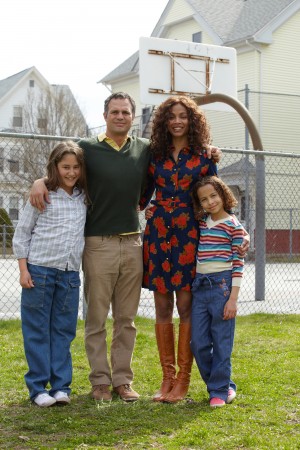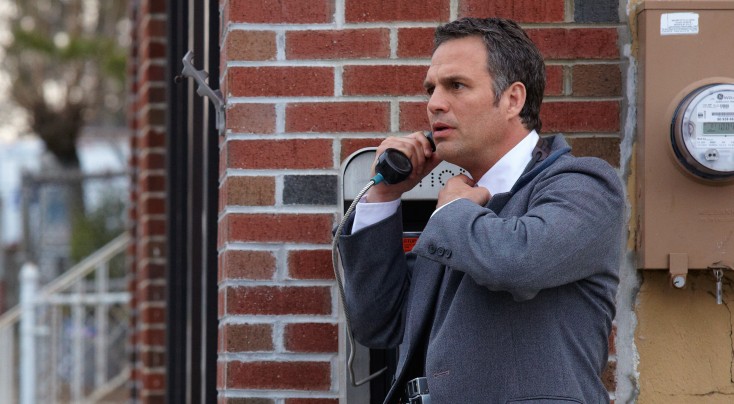
Imogene Wolodarsky as Amelia Stuart, Mark Ruffalo as Cam Stuart, Zoe Saldana as Maggie Stuart and Ashley Aufderheide as Faith Stuart in INFINITELY POLAR BEAR. ©Sony Pictures Classics. CR: Claire Folger.
By ANGELA DAWSON
Front Row Features
HOLLYWOOD—As Mark Ruffalo waits to hear official word on whether he will be returning as Bruce Banner/Hulk in “Avengers: Infinity War, Part 1,” slated to hit theaters in 2018, the peripatetic actor is keeping busy doing what he enjoys: making independent films.
He stars as Cam, the parent of two daughters who suffers from bipolar disorder in “Infinitely Polar Bear,” yet does what he can to be a good father. The drama is based on the true story of filmmaker Maya Forbes, who wrote and directed the film based on her own experience growing up with a father with the same disorder. Ruffalo co-stars alongside “Avatar’s” Zoe Saldana, who plays his understanding wife Maggie. Forbes’ real-life daughter Imogene Wolodarsky plays her mom’s character as an adolescent and Ashley Aufderheide (“The Slap”) plays the younger daughter.
Having recently toured the world promoting the Marvel blockbuster “Avengers: Age of Ultron,” Ruffalo, 47, is simply happy to have some time this summer to spend with his own family while shooting another film closer to home. He and actress wife Sunrise Coigney have a son and two daughters. He’s currently wrapping production on “Spotlight” in South Boston, in which he plays a newspaper reporter investigating allegations of sexual misconduct by the local Catholic archdiocese.
The two-time Oscar nominee (“Foxcatcher,” “The Kids Are All Right”) spoke about portraying another real life character, what he enjoys about independent film and what he knows about reprising Bruce Banner/Hulk.
Q: As Cam, you chain-smoking throughout the film. Tell me they were props.
Mark Ruffalo: They were. They were herbal cigarettes, but that doesn’t mean they’re any safer than tobacco cigarettes. When I wrapped this, I ended up in bed for two weeks with a terrible upper respiratory infection.
Q: Since this film is set in the ‘70s, I suppose it’s to evoke a period before people were acutely aware of the damaging effects of cigarettes.
Ruffalo: Yeah, and it’s quietly killing me. When I watch it, I’m like, “Oh yeah, I get it. I remember that time. I remember when people had cigarettes in their mouth all the time. My family was like that in the ‘70s.it was everywhere. I remember sitting in the dentist’s office and people smoking around you. There were ashtrays in the emergency room.
Q: How did you go about preparing for this role? How did you find the right tone for the character?
Ruffalo: I hope it’s the right tone. I’ve grown up with people who are bipolar, and I’ve known people who are bipolar. The thing to keep in mind is bipolar isn’t a person. The one thing that I felt was the most important thing was to capture who Cam was, essentially, and then lay the bipolar onto that. Bipolar is really just the extremes of emotions, and a certain sliding scale of where those emotions go. A lot of that was written into the script, and Maya (Forbes, the director) did a great job of helping me with that.
So I had to find out who Cam was. He really was the son of this blue-blood aristocracy, and that I didn’t understand. I’m blue-collar. I used to joke with Maya. I told that her family came over on the Mayflower a couple hundred years ago but my family came over in a rowboat 50 years ago. (He laughs.)
So I didn’t understand why (Cam’s wealthy) family didn’t help them. I didn’t understand all these rules and ways of speaking and do’s and don’t that don’t have any sort of rhyme or reason to them other than that was the way they did it. The fun part of was riding these extremes, and then it’s all grounded in his deep and abiding love for his daughters, and his belief in his family.
What’s so touching about him is there’s nowhere else he’d rather be than with Maggie (Saldana’s character) and those girls. His illness just prevents him from being viable as a breadwinner.
Q: I In the movie, you and the young actresses who play your daughters use a lot of profanity with each other. Can you tell a bit about that experience?
Ruffalo: It’s shocking when you hear it, but it’s kind of funny, actually. The journey that those girls make is from being helpless to being independent and in a weird way they’re also taking care of their father as he’s taking care of them. So mainly they grow up a little bit quick. When you look at the byproduct of this crazy, dysfunctional family, you have Maya Forbes, who’s an incredibly accomplished writer and director, and you have China Forbes (her younger sister), who is the lead singer of (jazz/pop group) Pink Martini. They’re strong women. I look at them and I hope my girls turn out like them.
So, yeah, maybe there are things that aren’t what we imagine to be the perfect family as far as their relationship with their father, but it worked, and maybe families work way more than we think they do. I like kids who assert themselves and have a sense of self-esteem, and are willing to say what they believe is right or wrong.
Q: Speaking of family, your life must be a big balancing act since you have such a busy career? What’s the biggest challenge for you?
Ruffalo: Just being away is just sort of the craziest negative of my great blessings. I don’t mean to complain. Movies are being made all over the world now. They’re rarely made locally, so just spending long periods of time away from them has really been the hardest part and most challenging part.
Q: Do your wife and kids visit you on the set?
Ruffalo: I have three special needs children. All of my kids are dyslexic, so they need a very specific kind of schooling. They have a hard time with transitioning, and so because of that, it’s very hard to take them out of school. Any kid would be hard pulling in and out of school, and I don’t want to disrupt their lives that way. But when I’m working, and it’s summertime, they come to visit me, so we spent last year in London, and that was fun. But most of the year is them being in school. So now I’ve been trying to focus on doing work near home, and how not to work so much. That’s kind of where I’m at right now.
Q: When you’re not turning green and smashing up buildings, audiences are seeing you almost exclusively in independent films. Why is that?
Ruffalo: That was the only job I could get for a long time. I love acting, and I don’t really see a difference between the kind of acting you do in a big movie or a small movie. Mostly, when you get into different kinds of styles it’s dictated by the genre, but also the director. Each director takes you on a trip that’s different from your previous experience, if you’re willing to go with him. I just found it interesting that I would be in these kinds of movies, because generally they don’t use actors like me in these movies. When Scarlett (Johansson, who plays Black Widow in the “Avengers” films) and I were on the tour, we would look at each other like, “What are we doing here?” We’re two indie cockroaches, and now we’re staying in these hotels. We’re these indie kids.
When I started with “You Can Count on Me” (in 2000), it was very clear what an indie movie was and a studio movie was. And since then, they’ve just come closer and closer together. Studio movies look more like indie movies, and indie movies look more like studio movies. The characters you used to see only in indie movies you’re now seeing in studio movies. I think it’s better that way, personally.
Q: What was the hardest scene for you to film in “Infinitely Polar Bear?”
Ruffalo: Yelling at the kids, being angry with them. There’s a scene when (one of the daughters) is holding onto me and I’m dragging her out. We had to keep it playful, but also to have a sense that he’s angry. That was a tough scene. But, I have to say, mostly, making this movie was a joy. Running next to the car and getting all my lines out also was a tough scene. I didn’t want to have to do that more than four or five times. I couldn’t do it more than four or five times, especially with a cigarette in my mouth. Most of it was a joy, though, to be honest with you.
Q: How was it working with Zoe Saldana?
Ruffalo: Amazing. I look at her and I think, “She’s way too pretty for me.”
Q: With your huge body of work, and all of the wonderful characters you’ve created, has one lingered more than another?
Ruffalo: What me and my wife have fondly come to refer to as “re-entry,” which is me coming back into the family after walking around with some total stranger for more times in my life than not. She’s like, “You totally change, every character. You come and start walking like them and you behave like them, and it’s a pain sometimes. You even talk like them.” I don’t see it personally. My feeling is you can’t really come into contact with these different people without having them change you in some way. Anything we do when we come into contact with somebody, you’re doing such intense investigation into somebody. Do I have one particular lingering character? None that I can think of have held on longer than another. They’re all in there somewhere, a little bit mixed-up, which can make you crazy. I’m not going lie to you.
Q: Robert Downey Jr. says you’re coming down to Atlanta for the next “Avengers.” Are you?
Ruffalo: I don’t know. I haven’t gotten a schedule. He told me, though. I haven’t heard from anyone else about the “Avengers” or “Captain America: Civil War.” If Robert told me, then it’s probably true. It hasn’t trickled this way down to me yet.
Q: You’re the last one to know, right?
Ruffalo: What do they say? “Actors are like mushrooms. They keep you in the dark, but after a while they open the door to throw some **** on you.”





